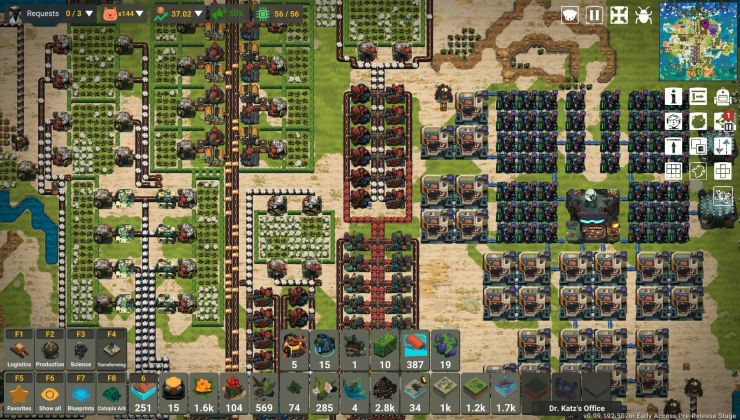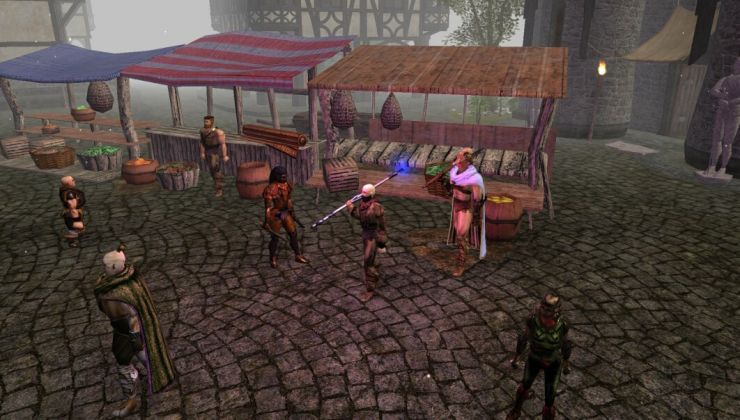When crowdfunding games, there's always a risk that something will go wrong. Sometimes games get cancelled, sometimes the Linux version gets cancelled and in the case of Eco from Strange Loop Games they're not exactly filling me with confidence.
On the original Kickstarter campaign for Eco back in 2015, the FAQ stated this:
We will be developing the release client targeting PC, Mac, and Linux platforms. During early stages of the project, such as during alpha, the server may only be usable on windows platforms, but by beta will be available for all 3 platforms.
The Steam Greenlight page for Eco was also listing Linux as platform, heck even their announcement on it about a release directly mentioned Linux was available. That same announcement is also on their official site, which mentions "For alpha the client will be released on PC, Mac, and Linux.". Given all that, I did purchase a copy personally to support it direct from their website. Since February 2018, it's been available on Steam but they only continue to advertise Windows support (despite a Linux version being there). We're talking almost four years since the Kickstarter and well over one year since being on Steam.
Before getting into anything else, I want to note that the developer has told me over email they currently class the game as being in "Beta". So we're at the stage, where Eco should have reasonably good Linux support by now but does it? No it does not. A Linux version exists but they won't advertise it, single-player only works on Linux with a workaround and now we're onto the below…
Why am I bringing all this up? Well, an interesting email entered my inbox recently, announcing that Eco would be adding in Vivox. Remember Vivox? The voice chat company whose staff actually suggested a developer drop Linux support? Yeah Vivox backtracked on it, but they still seem to have no plan in place to support Linux. Given that, you would think since Eco is supposed to be supporting Linux that Strange Loop Games wouldn't go and pick a middleware that locks out a platform but they did.
I reached out to Strange Loop Games and the resulting emails left me very unimpressed with them. They repeatedly claimed things like "It only was mentioned as a long-term goal on kickstarter" (clearly it wasn't) and "The linux client we offer actually is a internal alpha client we ship additionally without being required to do so." which seems pretty false, given the quote from Kickstarter and the release information they themselves posted onto Steam Greenlight and their official site.
There is a silver lining here (it's not all doom and gloom), as they told me "the plan is to deliver full linux support when the game is actually released" but given how long it has been so far and how they've reacted, it doesn't exactly fill me with hope.
They're far from the worst though, Stainless Games treated Linux gamers far worse with Carmageddon which was pretty ridiculous. Phoenix Point is another that still stings and it certainly all makes you think twice about supporting future crowdfunding efforts. However, thankfully the times where things like this do happen are still a minority, for the most part crowdfunding still results in something good but it pays to be careful.
But the straw that broke the camel's back for me to not crowdfund any games anymore was the outer wilds debacle (combined with phoenix point and shenmue3, although i wasn't involved in those).
Moral of the story for me, more than ever: i only buy games that have working Linux-builds and are (at least kind of...) finished...
Sad for all the games that might not make the cut in future crowdfunding campains, and i doubt the people that betrayed the trust of their backers are really aware of just how much they damaged the whole indie-scene...
I agree but eco work on linux.Anyone with a Mouse can hit Export in Unity. That's entirely away from the actual point of the article.
PC, Mac, and Linux
This should be the first red flag. If they can't even use the correct terminology, why are you trusting them with your money?
Last edited by ixnari on 16 Jun 2019 at 1:56 pm UTC
And I also think that crowdfunded games have even less excuse to cut Linux. They can't argue that the cost isn't worth it; they should have already budgeted for it when setting the goal, which was met. Now it is their problem. It is better to leave Linux out of the promises than to scam Linux users.
I think a positive example of crowdfunding Linux-wise is AI War 2. The game isn't finished yet (and, of course, it is late). But we have had Linux versions of the beta (and alpha, I think) for years already. The developer is also very open about the development (almost too much, but I like it).
I still think crowdfunding is an interesting model. It worked great for the "local" RPG scene; it helps a lot the vibrant indie community and enables the translation of mid-size RPGs that didn't really work traditionally. But I have grown skeptical of it for the really big projects, with $100k+ goals, huge teams, bombastic campaigns with lots of stretch goals or exclusives, ridiculously polished version right at start and so on. If you can't get to know the people involved, it probably shouldn't be using crowdfunding. I have also created a better opinion about Patreon-style crowdfunding, though mostly through friends that use it to get funded as I'm not currently in a position to contribute much. :/
They are the worst!
At least they had offered refund for
Last edited by riusma on 16 Jun 2019 at 4:54 pm UTC
They are the worst!
At least they had offered refund for bakers when Linux was cancelled. ;)
I didn't know pastries were affected, but at least bakeries had a choice. xD
But seriously, I think offering a refund is not even close to addressing the issue. It is maybe better than getting a game you will never run.
A company gets people to give them money under false pretenses; the money and number of backers are usually displayed in the campaign or in advertisements, misleading other backers; they hold on to the money usually for a long time; and usually the burden of asking for a refund is on the backer. So they take a "fraudulent" zero interest loan, benefit from user engagement for marketing, and they keep the money unless the backer puts in the effort to get it back. They use in bad faith the lax nature of crowdfunding to get away with stuff like this.
Which in the end means nothing more than that they used the Linux backers to get an interest-free loan.They are the worst!
At least they had offered refund for bakers when Linux was cancelled. ;)
Hosting a server works on Linux too if you use Mono. It's unofficial and unsupported but I didn't have any problem with the server so far.It can run natively, but it's so much more work than you would expect from someone you're paying to support Linux.
Of course servers are always more work than simply clicking install, but in the case of Eco, running a server is necessary for Linux users to play single-player, as the single-player mode in-game has never worked on Linux.
The normal way to do business, would be to start small, make a few small games, then gradually work up to larger projects off the back of the smaller ones.
If a game developer is crowdfunding, it means that first of all, they're likely taking on something of a much larger scope than they're probably ready for, that's warning flag number 1.
The second thing it means, is that they likely weren't able to find financial backing from any publisher or bank or anyone, which means no one wanted to invest the idea, that's warning flag number 2.
Crowdfunding comes with no strings attached or certainty at all that the game will even be made, so you can potentially throw your money at something that goes no where, which is very wrong, YOU should not be asked to take on that kind of risk, that risk should be taken on by the game developer. Because if the game is a success, it's the developer who will receive all the spoils of victory, and have a product to sell over and over again. You just get the opportunity to basically pre order a game. When it's the developer who gets the 'reward' then it's the developer should take on the 'risk' for that reward. And they likely would, if they themselves had any confidence in their project, which means they likely don't if they're using crowdfunding, that's warning flag number 3.
If none of those above statements apply to a crowdfunding project, because it's being made by a very capable team of people who have made very large games before and have an established game development studio and plenty of funds, and who wouldn't struggle to find a publisher for their project, and it's being made by people who are confident they can produce the final product, and that it will sell well.. then it means the company views crowdfunding as essentially just an interest free loan from people who are too generous with their money. They don't need the crowdfunding, they just want the cash, that's warning flag number 4.
There's a time and place for crowdfunding, and in my view, it's for projects that benefit a community. Funding the creation of a product that a company will own and sell, is not one of those in my opinion. A better use of crowdfunding would be crowdfunding the creation of FOSS licensed games for example, because then at least the people taking on the risks (the backers) are the ones who would receive the reward (a foss licensed game).
I think a positive example of crowdfunding Linux-wise is AI War 2. The game isn't finished yet (and, of course, it is late). But we have had Linux versions of the beta (and alpha, I think) for years already. The developer is also very open about the development (almost too much, but I like it).Hand of Fate was a good one too, I don't remember if there was much of a beta but Linux was included at launch and they were responsive to bug reports. Armello also worked on day 1 and has continued to be supported as far as I'm aware (I haven't actually played it in ages, but everything looks in order). Even Slain, with its abysmal launch, worked on Linux and kept support through the relaunch.
I still think crowdfunding is an interesting model. It worked great for the "local" RPG scene; it helps a lot the vibrant indie community and enables the translation of mid-size RPGs that didn't really work traditionally. But I have grown skeptical of it for the really big projects, with $100k+ goals, huge teams, bombastic campaigns with lots of stretch goals or exclusives, ridiculously polished version right at start and so on.Yeah, I've taken part in a couple projects by Cool Mini Or Not and the experience is vastly different. It's really just a glorified pre-order full of exclusives and shiny things meant to line their pockets early so they don't have to take out a loan to pay for the print run. I'd rather just get the basic product everyone else gets at release, off the shelf of a local store, and not have to pay for insane shipping.
Funding small teams has been a lot more rewarding since you get the sense that you're actually helping them make something that couldn't have been made otherwise for actual lack of money. Many of them are also more interested in feedback and backer participation along the way, and thankful for it, especially those who didn't have an audience at all prior to coming to the platform.
Last edited by Whitewolfe80 on 16 Jun 2019 at 6:01 pm UTC
Personally I'm pretty strongly of the opinion that crowdfunding is almost always a terrible idea and almost always used incorrectly.
The normal way to do business, would be to start small, make a few small games, then gradually work up to larger projects off the back of the smaller ones.
If a game developer is crowdfunding, it means that first of all, they're likely taking on something of a much larger scope than they're probably ready for, that's warning flag number 1.
The second thing it means, is that they likely weren't able to find financial backing from any publisher or bank or anyone, which means no one wanted to invest the idea, that's warning flag number 2.
Crowdfunding comes with no strings attached or certainty at all that the game will even be made, so you can potentially throw your money at something that goes no where, which is very wrong, YOU should not be asked to take on that kind of risk, that risk should be taken on by the game developer. Because if the game is a success, it's the developer who will receive all the spoils of victory, and have a product to sell over and over again. You just get the opportunity to basically pre order a game. When it's the developer who gets the 'reward' then it's the developer should take on the 'risk' for that reward. And they likely would, if they themselves had any confidence in their project, which means they likely don't if they're using crowdfunding, that's warning flag number 3.
If none of those above statements apply to a crowdfunding project, because it's being made by a very capable team of people who have made very large games before and have an established game development studio and plenty of funds, and who wouldn't struggle to find a publisher for their project, and it's being made by people who are confident they can produce the final product, and that it will sell well.. then it means the company views crowdfunding as essentially just an interest free loan from people who are too generous with their money. They don't need the crowdfunding, they just want the cash, that's warning flag number 4.
There's a time and place for crowdfunding, and in my view, it's for projects that benefit a community. Funding the creation of a product that a company will own and sell, is not one of those in my opinion. A better use of crowdfunding would be crowdfunding the creation of FOSS licensed games for example, because then at least the people taking on the risks (the backers) are the ones who would receive the reward (a foss licensed game).
I disagree a lot with this view. It is very "big company" centered as opposed to individuals and real indie groups, and then of course it looks bad; that is not what crowdfunding was supposed to do.
1) Not really. It might mean they have the technical, design and even management skills... but not the capital to invest. The same reason why they would go somewhere else for funding, except it doesn't take control away from the developers and into "investors" (rich people that have the money necessary to make things, but that aren't actual developers themselves).
2) This is the point I have more problems with. This assumes that crowdfunding is just a last resource and not an advantageous model in itself - and, for reasons both good and bad, crowdfunding can often be better.
More importantly, it also assumes that publishers, banks, studios, etc always make good calls and that every kind of project could easily get funding, which is not true. They are often biased in favor of more mainstream projects over niche or innovative ones, for example. And projects of a certain scale are just below their interest. And while videogames (in particular of certain genres) have lots of big players, that isn't true of every kind of project. Lastly, the criteria investors use have less to do with what is best for final costumers and more with their business strategy - for example, proprietary software.
It also often impacts the creative independence of authors and developers, which might be good (you are looking for an editor to avoid screwing up) or bad (it prevents you from realizing your vision, particularly if you want to make something bold or unique).
3) The kind of risk taken is very different. A big part of crowdfunding is that projects only succeed if there are enough interested "customers" backing it, and if there aren't no one loses any money - so there isn't the risk that it isn't going to sell. The risks involved are regarding developer ability and honesty, and there are certainly challenges in minimizing that risk.
But part of the point is that customers are accepting some degree of risk because otherwise that project would not be possible at all. Sometimes developers can't or won't take that much risk/debt, so either people "share the burden" or things don't happen. It is easy to talk about risk and investment from the point of view of big entrepreneurs... but sometimes, there are just normal people that aren't willing to risk their homes or the financial security of their families over a project, no matter how much they believe in it. The alternative, of course, is having all projects funded by big companies directly or indirectly, but see #2.
4) Well, on this I agree; projects that don't need the funding shouldn't use crowdfunding for self-promotion and increased profit margins.
I think the big takeaway should be that crowdfunding was just never meant for large mainstream projects.
Yeah, I've taken part in a couple projects by Cool Mini Or Not and the experience is vastly different. It's really just a glorified pre-order full of exclusives and shiny things meant to line their pockets early so they don't have to take out a loan to pay for the print run. I'd rather just get the basic product everyone else gets at release, off the shelf of a local store, and not have to pay for insane shipping.
Funding small teams has been a lot more rewarding since you get the sense that you're actually helping them make something that couldn't have been made otherwise for actual lack of money. Many of them are also more interested in feedback and backer participation along the way, and thankful for it, especially those who didn't have an audience at all prior to coming to the platform.
I was thinking exactly of CMON when writing that. They have a gamified pre-order system with tons of publicity, and call it crowdfunding.
I don't think crowdfunding is to be avoided at all costs; I feel like crowdfunding devs with a proven track record for Linux support is usually a safe bet. In the end though, like any other investment, it's a gamble, so it all comes down to how much you want to risk for the potential reward.
back in the days i was excited about 3 things: yooka laylee (wich was an disaster during the relase, looks like an patch fixed some of its issues later, but still, is not an master piece), blood stained, and might n9 (wich floped).
mn9 flooped and so did yooka layle, so i was hopefully that blood stained wouldnt, but then, they canceled the linux version due to some midleware they used, wtf? they had promissed an linux version as the base and this quoted midleware was not even in the plans of the base game nor afaik in the strech goals, yet they canceled the linux version in favor of it.
now i dont know if i wish it to be an flop (so i will not be missing anything) or an sucess (so at least, we can play it on wine or steamplay some time in the future) but then i will be pissed of that we helped to fund an game that not only we cant play, but that add value to the windows ecosystem and reduce the value of our platform.
well, now i'm happy that i didnt fund it (i didnt had money back then)












 How to set, change and reset your SteamOS / Steam Deck desktop sudo password
How to set, change and reset your SteamOS / Steam Deck desktop sudo password How to set up Decky Loader on Steam Deck / SteamOS for easy plugins
How to set up Decky Loader on Steam Deck / SteamOS for easy plugins
See more from me